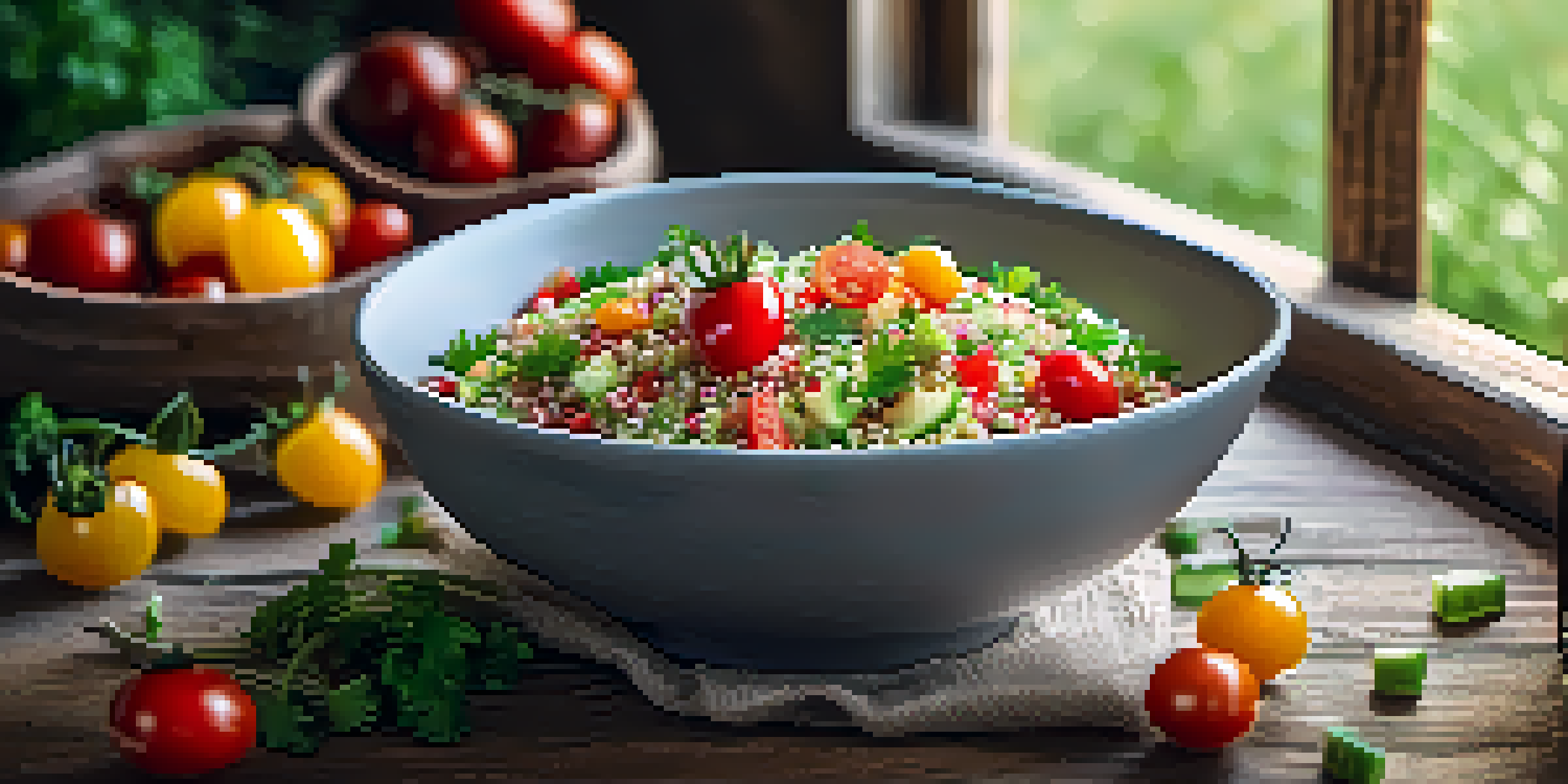How Whole Grains Contribute to Vegetarian Nutritional Needs

Understanding Whole Grains and Their Benefits
Whole grains are grains that contain all parts of the grain kernel: the bran, germ, and endosperm. This means they are packed with nutrients, including fiber, vitamins, and minerals, making them an essential part of a vegetarian diet. Unlike refined grains, which have been stripped of these beneficial components, whole grains provide a more balanced source of energy and nutrition.
Let food be thy medicine and medicine be thy food.
Incorporating whole grains into meals can enhance flavor and texture while also boosting overall health. Foods like brown rice, quinoa, barley, and whole wheat bread not only fill you up but also keep your digestive system working smoothly. Plus, their rich variety of flavors can make meals more enjoyable.
For vegetarians, whole grains can be a primary source of carbohydrates, which are vital for energy. They also contribute to satiety, helping you feel full longer and reducing the need for snacking on less nutritious options.
Essential Nutrients in Whole Grains
Whole grains are loaded with essential nutrients that vegetarians need to maintain a balanced diet. They are particularly rich in B vitamins, such as thiamin, riboflavin, and niacin, which play critical roles in energy metabolism. Additionally, these grains provide important minerals like iron, magnesium, and zinc, which are often harder to obtain in vegetarian diets.

Fiber is another key component found in whole grains, promoting healthy digestion and helping to regulate blood sugar levels. This is especially important for vegetarians, as fiber can help offset the risk of digestive issues that sometimes arise from a plant-based diet.
Whole Grains Boost Nutrition
Whole grains provide essential nutrients like fiber, vitamins, and minerals that are crucial for a balanced vegetarian diet.
Moreover, whole grains contain antioxidants and phytochemicals that support overall health. These compounds can help reduce inflammation and may lower the risk of chronic diseases, making whole grains a smart choice for anyone looking to improve their health.
Protein Sources from Whole Grains
While many people associate protein primarily with meat, whole grains can also contribute to your daily protein intake. Though they may not provide complete proteins on their own, when combined with legumes, nuts, or seeds, they create a powerful protein source. This combination is especially beneficial for vegetarians seeking to meet their protein needs.
Whole grains are a fundamental part of a healthy diet, providing essential nutrients and promoting overall well-being.
For example, pairing whole grains like brown rice with black beans creates a complete protein meal. This not only enhances the nutritional profile but also adds variety to your diet. Understanding how to mix and match these foods can make meal planning both simple and satisfying.
It's important for vegetarians to be mindful of protein intake, as it plays a crucial role in muscle repair and the production of hormones and enzymes. Whole grains can complement other protein-rich foods in a vegetarian diet, ensuring you get the necessary nutrients.
Whole Grains and Heart Health
Consuming whole grains is linked to better heart health, which is particularly important for vegetarians. Whole grains help reduce cholesterol levels and lower blood pressure, both significant factors in heart disease. The fiber and antioxidants found in these grains contribute to maintaining a healthy cardiovascular system.
By incorporating whole grains into your meals, you can enjoy delicious foods while also taking care of your heart. Foods like oatmeal, whole grain pasta, and whole grain cereals can easily become staples in your diet, providing both taste and health benefits.
Heart Health and Whole Grains
Incorporating whole grains into your meals can improve heart health by reducing cholesterol levels and blood pressure.
Furthermore, a heart-healthy diet rich in whole grains can lead to improved overall well-being. It’s a win-win situation: tasty meals that are good for you!
Promoting Digestive Health with Whole Grains
Whole grains are a fantastic source of dietary fiber, which is essential for maintaining a healthy digestive system. Fiber helps to keep things moving through the intestines, preventing constipation and promoting regularity. This is particularly beneficial for vegetarians who may rely heavily on plant-based foods.
Including whole grains in your daily diet can also support the growth of healthy gut bacteria. A well-balanced gut microbiome is vital for digestion, immune function, and even mental health. Foods like whole grain bread, oats, and quinoa can serve as the foundation for a gut-friendly diet.
In simple terms, the fiber in whole grains acts like a broom, sweeping through your digestive tract and ensuring everything stays clean and functioning properly. Who wouldn't want that?
Versatile Ways to Include Whole Grains
One of the best things about whole grains is their versatility. Whether you're cooking a hearty breakfast, a filling lunch, or a satisfying dinner, whole grains can easily fit into any meal. Start your day with oatmeal, enjoy a quinoa salad for lunch, and finish with a stir-fry using brown rice.
Experimenting with various whole grains can keep your meals exciting and flavorful. Try swapping out white rice for farro or using whole grain tortillas instead of regular ones. This not only adds variety but also boosts your nutritional intake.
Versatile and Easy to Prepare
Whole grains are versatile and can easily be included in various dishes, making healthy eating both exciting and manageable.
With so many options available, there's no need to limit yourself. The culinary world of whole grains is vast and can elevate your vegetarian cooking to new heights.
Tips for Choosing and Preparing Whole Grains
When selecting whole grains, look for products labeled '100% whole grain' or 'whole grain' as the first ingredient. This ensures you're getting the maximum nutritional benefits. Be mindful of added sugars or preservatives in packaged foods, as these can detract from the health benefits of whole grains.
Preparing whole grains is also straightforward. Many can be cooked in large batches and stored for quick meals throughout the week. For instance, cook a big pot of quinoa or brown rice, and use it in salads, stir-fries, or grain bowls to save time.

Finally, don’t hesitate to get creative! Add spices, herbs, or vegetables to your whole grain dishes to enhance flavor and nutrition. The more you enjoy your meals, the more likely you are to stick with healthy eating habits.